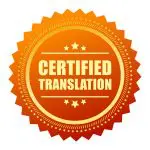Certified Translation Services
Accurate, certified translations of official documents in over 100 languages. GTS provides translations accepted by USCIS, IRCC, and other global authorities—delivered fast with guaranteed confidentiality.
Click here if you need translations for USCIS.
ISO 17100 Certified | Accepted by USCIS & IRCC | Statement of Accuracy Included
Get an Instant Translation Quote
Certified Translation Services You Can Rely On
GTS is the best provider of certified translation services. Our translations are guaranteed to be accepted by USCIS. All translations are delivered with a signed Statement of Accuracy certificate at no extra charge.
Instant Price Quotes for Certified Translation Services
Click here to get an instant certified translation online price quote. Just upload your documents to get a price quote in seconds. Most certified documents are delivered in 24 hours or less.
Why choose GTS as your Certified Translation Agency?

GTS Translation is a certified translation company. Our quality system is compliant with the ISO 17100:2015 standard.
Our certified translations are accepted by the US Citizenship and Immigration Services (USCIS), the Bundesamt für Migration und Flüchtlinge (German Federal Office for Migration and Refugees), by Immigration, Refugees and Citizenship Canada, and most other immigration authorities worldwide.
We provide a signed State of Accuracy certificate with every translation. The signed certificate can be downloaded together with the translation once your order is ready.
Certified Translation Document Types
GTS provides certified document translation of any type of document for official purposes. This includes:
- Birth and death certificates
- High school and college transcripts
- University diplomas
- Course completion certificates
- Marriage and divorce certificates
- Wills
- Court documents
- Immigration documents
- Medical reports
- Police reports
- Translation of tax statements

What is a certified translation?
When discussing certification of translation, it is important to mention that there is no global standard that defines what a certified translation is. There are many different types of certification.
Additionally, the type of certification you will need depends on the country where the translation is being submitted, the body to whom it is being submitted and on other requirements.
The following are some guidelines that will help you in getting the type of certification you need.
- The ISO 17100:2015 standard is specific to translation companies. This standard specifies the requirements for translation service providers (TSP) with regard to human and technical resources, quality and project management, the contractual framework, and service procedures.
- By default, translation certification is not required. Most translations require no type of certification. This includes technical manuals, data sheets, legal documents and patents which are used for reference, web site content, brochures, marketing material and software documentation.
- Certified translations are typically required when submitting official documents in foreign countries such as birth/death certificates, marriage licenses and college transcripts. Certified translations may also be required when submitting documents in a court of law; when submitting documents to Insurance companies; when submitting clinical trial documents to Institutional Review Boards (IRBs); when submitting bid documents in response to a foreign government-sponsored tender.
- When you are required to submit a translation, carefully check the requirements and the type of certification required before ordering the translation. After you have determined the translation requirements, select the translation company or translator who can meet those requirements.
- A certified translation is typically delivered with a translation certificate, which can be an affidavit signed by the translator; a notarized affidavit signed by the translator; a letter from the translation company with its seal/stamp; a letter from an attorney in the local country; an Apostille that authenticates the signatures and stamps on a document. Click here to see a sample translation certificate issued by Global Translations.
- Certified Translators. A good way to ensure that your translation is certified is to get a translator who is certified by an accredited translation organization such as the American Translation Association (ATA). The ATA offers certification in selected language pairs (e.g., Japanese to English). Other associations that offer translation certification are the Association of Translators and Interpreters of Ontario (ATIO) and the AITI (Associazione Italiana Traduttori e Interpreti).
It should be mentioned that merely being a member of such an association does not mean that the translator is accredited by that organization. For example, any translator can join the ATA without gaining accreditation. And also note that some organizations, such as the JAT (Japanese Association of Translation) and the ITA (Israel Translation Association) have no system of accreditation in place and can therefore not accredit translators. - Diplomaed Translators. In many countries, there are institutions of higher education and universities that offer training in translation. For example, Universities in Germany offer a Diplom-Übersetzer degree (roughly translated as Diplomaed Translator). Having this type of degree usually means that the translator is highly competent, but it is unclear whether these types of diplomas have any official standing
- Sworn Translators. In certain countries, sworn translators are authorized by the government to translate documents. Documents translated by sworn translators are official documents which are recognized by courts of law and government offices.
-
Notarized Translation. A notarized translation is referred to when a third-party approval is required. In this type of translation, a notary public confirms the completeness and accuracy of translation.
Where Our Certified Translations Are Accepted
| Category | Accepted By |
|---|---|
| Government & Immigration | USCIS • US CBP • U.S. Department of State • Federal & State Agencies |
| Airlines & Travel | All U.S. Airlines • Airport Security (TSA) |
| Education & Credential Evaluation | ECE • WES • SpanTran • Josef Silny • U.S. Colleges & Universities |
| Legal | U.S. State & Federal Courts • Law Firms |
| Employment & Licensing | Corporate HR • Licensing Boards • Background Check Agencies |
| Medical & Insurance | Hospitals • Clinics • Insurance Companies |
Types of official documents that may need to be certified
- Certificates regarding civil status: birth/death/marriage/divorce/single status certificates, vital records
- Academic documents: diplomas, transcripts, course certificates
- Medical documents: general medical reports, prescriptions, physician’s/hospital report
- Financial documents: salary certificates, tax/bank/credit card statements
- Property documents: sale contracts, deeds, transfers
- Utilities: electric/water/gas/telephone bills
- Personal documents: identity cards, passports, driver’s licenses, visas, residence permits
Suitable for Use With U.S. Customs and Border Protection (CBP) and U.S. Airlines
GTS provides certified translations that are fully suitable for use with U.S. Customs and Border Protection (CBP) and with U.S. airlines during international travel and immigration processing. Our translations are accurate, word-for-word, and include all seals, stamps, signatures, and annotations required by CBP officers when verifying foreign-language documents. Travelers often need certified translations for CBP secondary inspection, identity confirmation, travel-with-minors documentation, medical certificates, and proof-of-relationship documents at airport check-in. GTS certified translations meet all CBP and airline expectations for clarity, completeness, and authenticity—ensuring your travel documents are accepted without delay.
U.S. Government Employment Background Checks
GTS delivers certified translations suitable for U.S. government employment background checks, including federal, state, and contractor clearance processes. Many agencies require English translations of foreign police certificates, military records, birth certificates, marriage records, and academic credentials as part of federal employment screening or public-sector background investigations. Our certified translations are word-for-word, include all seals and notarial elements, and come with a signed statement of accuracy that meets the documentation standards used by federal HR departments, security-clearance investigators, and government contractors. If you are applying for federal jobs, airport security positions, DoD contractor roles, or public safety employment, GTS certified translations ensure your documents meet U.S. government requirements.
Common Documents which need certification in Germany
Here is a list of common documents which need certified German translation services. The German names are also included.
- High school diploma (Abiturzeugnis)
- Bachelor / Master / Diploma certificate (Bachelor-/Master-/Diplomurkunde)
- Driver’s license (Führerschein )
- Birth certificate (Geburtsurkunde )
- Marriage certificate (Heiratsurkunde )
- Registration card (Meldebescheinigung)
- Decree of divorce (Scheidungsurteil)
- Commercial registration document (Handelsregisterauszug)
- Police Certificate of Conduct (polizeiliches Führungszeugni)
We provide both German English translation service and English German translation service.
Click here to see a free sample translation of a Police Certificate of Conduct (polizeiliches Führungszeugni).
How do you certify a translation?
To certify a translation, attached a signed translation certificate or a signed translator affidavit that lists the credentials of the translation company or translator. The certificate should state the language pair and attest to the accuracy of the translation.
Who can certify a translated document?
For most uses (like immigration documents), a translation company or translator with recognized accreditation credentials can certify a translated document. Some countries have a system of state-certified translators.
In some countries, a translation needs to be notarized by an attorney who is also a translator. And in some legal systems, translations must be done by sworn translators. Check the translation certification requirements on a case-by-case basis to determine who can certify your translation.
How to certify a translated document?
If you already have had your document translated and need to certify it, find another translator with recognized credentials and certification to review the translation and provide a signed affidavit attesting to the accuracy of the translation.

